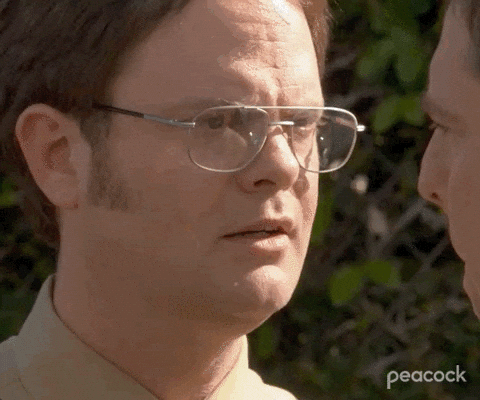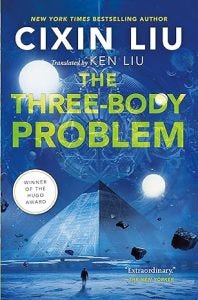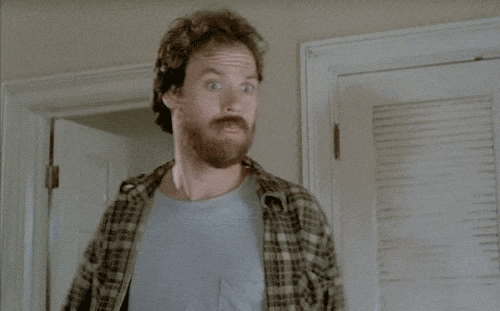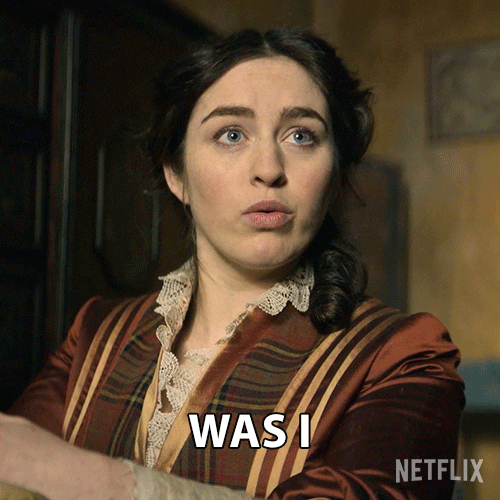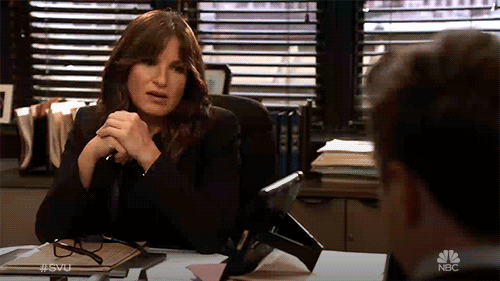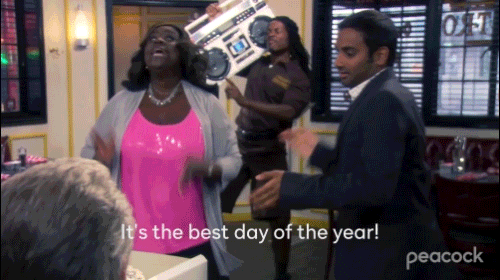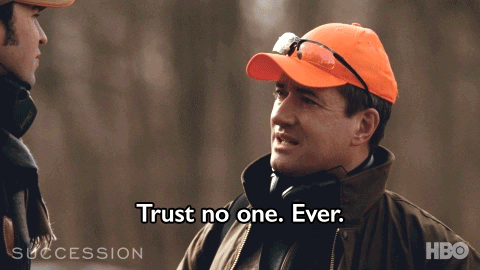Book Review: The Three-Body Problem
I have a lot to say about this book--almost all of it good...
Good morning, friends, and happy October!
I won't bore you with more ruminations on fall except to say that October gives me a chance to mention two of my favorite literary things ever--Anne of Green Gables, by L. M. Montgomery, and Something Wicked This Way Comes, by the great Ray Bradbury. I mention the former because of the perfect line, "I'm so glad I live in a world where there are Octobers." And I mention the latter because the whole wonderful story takes place in October, and the book is filled to overflowing with amazing images of October--everything from the charmingly fallish to the eerily terrifying.
If you have never read Something Wicked This Way Comes, please close this blog immediately and remedy that situation this instant.
All right, now that you're either back or you've determined to re-read Bradbury's wonderful story later, let's get on with this week's book review: The Three-Body Problem, by Cixin Liu.
Here's the blurb from Amazon:
"Set against the backdrop of China's Cultural Revolution, a secret military project sends signals into space to establish contact with aliens. An alien civilization on the brink of destruction captures the signal and plans to invade Earth. Meanwhile, on Earth, different camps start forming, planning to either welcome the superior beings and help them take over a world seen as corrupt, or to fight against the invasion. The result is a science fiction masterpiece of enormous scope and vision."
TL;DR
This is the part where I try to condense my thoughts down into just a few sentences, but with this book, it's tough. I struggled a little with the first third or so, but then it got really hard to put down. The entire idea is so original that it sort of has an Asimov feel to it--it's a bit like reading The Foundation Trilogy and realizing that it was the first time anyone put those particularly ideas into a story.
Also, Liu's storytelling has a very non-Western feel to it, and I'm not sure if that's a cultural difference or just the fact that, as he says, he is very drawn to a certain kind of science fiction. Overall, I think this is a 4-star book or maybe a 4.5-star book.
The Reading Experience
The reading experience on this one was... interesting. It's translated from the original Chinese, and as far as I can tell, it's an excellent translation. However, there were some places where the translation was obvious in the sense that the English was just too clean--too perfect. This problem mostly showed up in the dialogue, where I often thought the translation missed some level of nuance or affect.
As I mentioned, it also took me a little while to really get into the story, and I think this is actually one of the advantages of the book--it's kind of a slow burn. The set up takes a while, but once you get to the middle of the book, you start to see where it's going and get a better sense of the narrative arc. By the end, everything falls in place. While I struggled a bit in the beginning, in hindsight, I can see what Liu was doing along the way, and I tip my hat to him.
Observations
Content Warning: Contains Math
As many of you know, I am not much of a math person. I am probably more capable than I usually admit--I did pretty good on my SATs back in the day--but I am, essentially, lazy. I'm the same way with science. I'd rather read a synopsis of a study rather than the original study. And the harder the math or science, the more likely I am to look for an article that puts the cookies on the bottom shelf for me.
The Three-Body Problem is definitely more on the hard side of science fiction. In fact, the three-body problem is a real thing in physics--a reality that I was completely unaware of until I started writing this blog post. And in addition to much discussion of possible solutions to the three-body problem in this book, there is also a fair amount of talk about nanotechnology, quantum computing, quantum entanglement, and manipulating subatomic particles--all of which is far, far beyond my ability to wrap my brain around.
If it's really important to you to understand everything in a book and you know that science and math are not your strong suits, proceed with caution. If, however, you're okay with sort of skimming over the difficult bits and focusing on character and plot--as I am--then you will probably be just fine.
That Historical Lens Seems a Little Smudged...
I am ashamed to say that I honestly do not know very much about the Cultural Revolution in China, but I found it absolutely astounding that Liu opened his book with some really chilling scenes from this period in the late sixties--including the brutal murder of a science professor after a struggle session where he refused to denounce ideas like Einstein's theory of relativity.
Liu doesn't seem to shy away from the reality of the Cultural Revolution, and apparently, Ken Liu, the book's translator, told participants in a Reddit AMA that criticizing the Cultural Revolution is not forbidden. Still, in its original form, the chapters concerning the Cultural Revolution sat in the middle of the story to avoid the scrutiny of government censors--which suggests that authors do need to perform some level of self-censorship.
I confess that I worried about reading an apologetic for China's brutal regime, but that's not at all what I got. In looking up information about Liu, it appears that he tends to support some of China's worst policies, such as the internment of the Muslim Uighurs. On the other hand, the book itself is surprisingly apolitical. In fact, once the story moved into the present day, there was barely a mention of any government aside from a global organization of scientists and a police precinct.
The Pacific Ocean Is Narrower Than It Seems... And Also Wider...
This book reads like a movie in some ways, which makes sense. According to that New Yorker piece about Liu (linked above), he loves big Hollywood blockbusters. That influence is evident in some of the sweeping, high concept scenes that play out in a way that one can almost hear a John Williams score in the background.
There's also the fact that some of the characters in this book seem like they're straight out of an American popcorn movie. Take Shi Qiang, the police detective whose nickname is "Da Shi," which means "Big Shi." You could plunk Da Shi in the middle of an American police procedural, and no one would notice the difference between him and any other hard-bitten, chain-smoking, sarcastic police detective you might pull out of an episode of one of the many iterations of Law & Order. It might not surprise anyone to learn that Da Shi was, by far, my favorite character in this book.
On the other hand... There's something about this book that feels very non-Western. Ken Liu suggests as much in his translator's note at the end of the story:
"The Chinese literary tradition shaped and was shaped by its readers, giving rise to different emphases and preferences in fiction compared to what American readers expect. In some cases, I tried to adjust the narrative techniques to ones that American readers are more familiar with. In other cases, I've left them alone, believing that it's better to retain the flavor of the original."
I'm not sure I can even point to a specific place in the book where this Chinese literary tradition is obvious; it's more of just a sense that one is reading something distinctly not of one's own culture. I read Les Miserables several years ago, and I didn't get this same sense, so I don't think it's just the difference between English and Chinese. I think it's something about a Western way of thinking versus an Eastern one. Les Miserables comes from a Western literary tradition, so the storytelling was more familiar, whereas The Three-Body Problem just felt different.
Please don't read this as a judgment about the value of one culture over another--that's not what I'm doing here. I'm just saying that there is something different about each one that is likely reflected in both our language families and our literary traditions that isn't entirely translatable, and that distinction comes through in this book.
Would I Recommend?
Yes, for sure. I've never read anything quite like it, and I think it's the kind of book that is really valuable for getting a peak into another culture and way of telling stories.
Will I Read More of This Author?
Yes! I ordered the second and third books in the trilogy as a little birthday treat for myself.
What's Next on My List?
Next up are a couple of non-fiction books, but after that, I would like to finish Liu's trilogy. I think I'll try to review the whole thing when I'm done.
Next week, I am sharing some lessons I've learned from all these years of reading speculative fiction. Hint: there's a lot about not trusting machines... or governments… or people...
See y'all next week!





